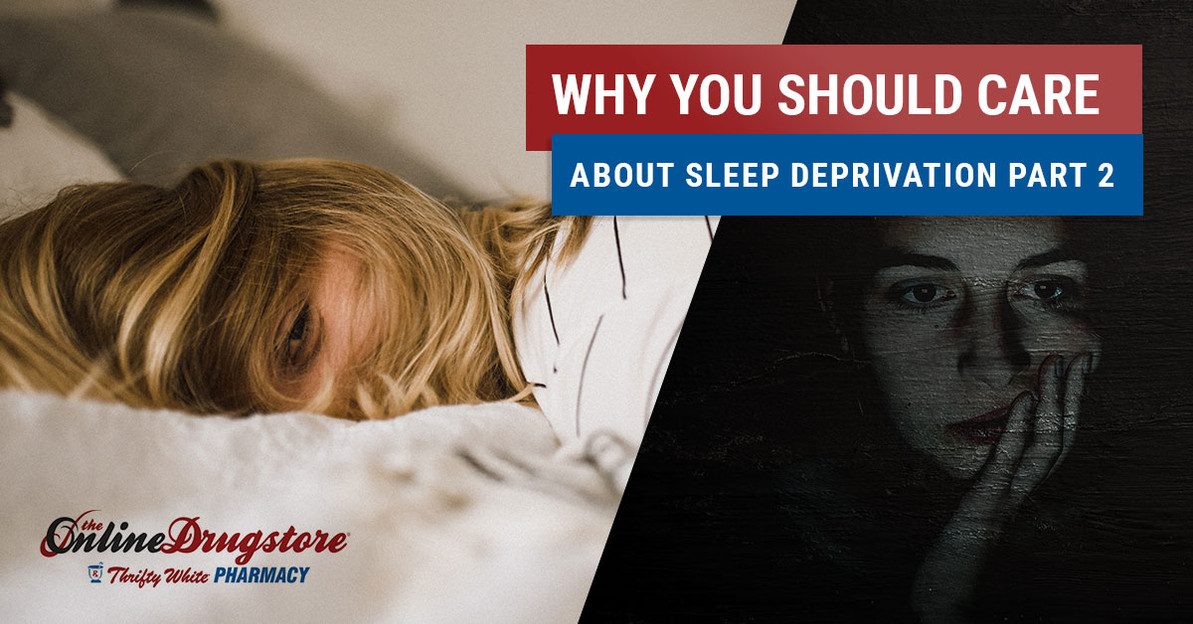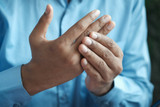Why You Should Care About Sleep Deprivation (Part Two)

In part one, we examined how technology and stress are major contributors to our sleep deprivation. In today’s post, we’ll delve deeper and look at number of statistics, more reasons sleep deprivation manifests, and how to combat it.
At The Online Drugstore, we want to help you get a better night’s rest and break the harmful cycle of sleep deprivation. Check out our safe online pharmacy to fill your sleep prescriptions, or to find other sleep aids, such as melatonin.
The Facts About Sleep Deprivation
- We’re good at a lot of things, but not sleeping…
- One in every five Americans has a chronic sleep disorder — that’s around 50 million people.
- Between eight to 18 percent of people struggle with insomnia.
- A study from the National Health Institute found that 30 percent of people are getting less than six hours of sleep each night.
- A study by the International Journal of Occupational Medicine and Environmental Health found
- that levels of sleep deprivation can be compared to a blood alcohol concentration of 0.10 percent!
What else causes sleep deprivation?
Besides technology and stress affecting your sleep patterns, other things can as well.
- Medications
- Alcohol and drug use
- Poor eating habits that spike your blood sugar
- Eating too much or not enough at dinner
- Pregnancy
It has also been found that a lack of sleep can contribute to mental disturbances that can trigger or worsen symptoms. The theory behind this is that the body experiences increased inflammation, hormonal issues, and adenosine modifications that build in the day time, making for hallucinations and other disturbances.
What Helps Sleep Deprivation?

There are a number of routes you can take to address sleep deprivation. If it’s in an early stage, you may want to try the following remedies:
Creating healthy eating habits - Processed sugars and carbs spike your blood sugar and can make it difficult when falling asleep. Try adjusting your diet to a unprocessed, whole-foods diet as much as possible. At dinner, focus on protein, veggies, and some carbs, and avoid eating too much.
Learning how to manage stress - Practice meditation, yoga, or deep breathing exercises. Doing things that is calming always helps reduce stress, and this can be playing music, drawing, reading, hiking, and aromatherapy.
Avoiding blue light from devices at night time - Instead of spending your evening winding down with electronics, try something else, such as playing a board game or catching up with a good book.
Exercise - Exercise is a great way to help regulate hormones, thus, balancing your circadian rhythm. Try exercising in the morning — or really any time before bed — to feel calmer and get more restful sleep.
Get natural light during the day - Natural light does wonders for your body and circadian rhythm, in addition to regulating thousands of brain cells. Try getting out on your lunch hour and after work for natural light and a little vitamin D, too!
Get into a bedtime routine - Our bodies like routines, and the more scheduled your night time routine is, the better chances you’ll have at falling asleep. Keep your room cool and dark, and relax into a routine by brewing a cup of sleepy tea or taking a shower.
If your sleep deprivation is more advanced, consider implementing the following:
- Herb and supplements - This can be melatonin or other supportive herbs, such as valerian, California poppy, hops, or L-theanine.
- Addressing sleep problems - If you have sleep apnea or a teeth grinding issue, addressing these issues will undoubtedly help you sleep better.
- Using sleep aids - While sleep aids are not the most advantageous option in the long term, for short-term support, ask your doctor about a prescription sleep aid.
While technology and stress are modern causes of sleep deprivation, it can also be caused by medications, substance overuse and abuse, eating patterns, and pregnancy. If your sleep is being affected, it’s important to address these issues, so the cycle isn’t prolonged.
There are many things you can implement before turning to a sleep air or prescription pharmaceutical, including exercise, eating healthy, and establishing a bedtime routine — just to name a few!
Healthy sleep is so good for us and makes us better at our jobs and handling stress!
Combat the effects of sleep deprivation naturally with nutritional supplements, such as melatonin! Shop The Online Pharmacy today!
Recent Posts
-
How to Avoid Getting Sick When Spring Weather Changes Arrive
As we wave goodbye to winter and cold, biting winds turn to a light, refreshing breeze, it’s only na …22nd Mar 2024 -
Essential Spring Cleaning Tips for 2024 (Checklist Included)
As the winter frosts melt away, the springtime brings an uplifting sense of renewal. Without the pre …22nd Mar 2024 -
Natural & Medicinal Arthritis Pain Relief Tips for Winter
It's common for arthritis pain to flare up during the winter months for several reasons:Lower temper …21st Feb 2024




